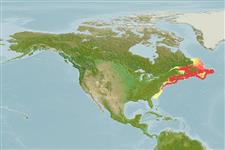Common names from other countries
Environment: milieu / climate zone / depth range / distribution range
البيئة
بحري القاع; محيطية (Ref. 51243); نطاق العمق 55 - 914 m (Ref. 58452). Temperate; 55°N - 24°N, 80°W - 42°W (Ref. 54581)
Northwest Atlantic: coast of Canada and USA from Bell Isle Channel to the Bahamas; most common from southern Newfoundland to South Carolina.
Length at first maturity / الحجم / وزن / العمر
Maturity: Lm 23.2 range ? - ? cm
Max length : 76.0 cm TL ذكر/ مختلط الجنس; (Ref. 1371); common length : 37.0 cm TL ذكر/ مختلط الجنس; (Ref. 1371); common length :65 cm TL (female); أعلا وزن تم نشرة: 2.3 kg (Ref. 1371); العمر: 12 سنين (Ref. 1371)
الأشواك الظهرية (المجموع) : 1; الأشعة الظهرية الناعمة (المجموع) : 47 - 54; شوكة شرجية: 0; أشعه شرجية لينه: 37 - 41. Head large, about 30% of SL . Pectoral fins long, reaching origin of anal fin. Overall color is silvery, somewhat brownish on back, whitish on belly.
Abundant on sandy grounds and strays into shallower waters. A voracious predator with cannibalistic habits. Individuals over 40 cm TL prey on fishes such as gadoids and herring, while smaller ones feed on crustaceans, i.e. euphausiids and pandalids; food also includes gaspereau, myctophids, smelt, silversides, mackerel, sand lance, butterfish, snakeblennies, longhorn sculpins and squids (Ref. 5951). The smallest specimen feeds mostly on crustaceans (Ref. 58452). Exhibits seasonal onshore-offshore migration (Ref. 9988). Spawning takes place from June-July in the mid-Atlantic region; July-August in the Gulf of Maine and to the north of Georges Bank, and August-September on the Scotian Shelf (Ref. 58452). Marketed fresh, smoked and frozen; fresh fish are exported to European markets; eaten fried, broiled, microwaved and baked (Ref. 9988).
Spawning appears to be strongly influenced by water temperature, and annual variations occur both in the peak and the range of the spawning period, which may influence considerably the growth of juveniles.
Cohen, D.M., T. Inada, T. Iwamoto and N. Scialabba, 1990. FAO species catalogue. Vol. 10. Gadiform fishes of the world (Order Gadiformes). An annotated and illustrated catalogue of cods, hakes, grenadiers and other gadiform fishes known to date. FAO Fish. Synop. 125(10). Rome: FAO. 442 p. (Ref. 1371)
IUCN Red List Status (Ref. 130435)
CITES (Ref. 128078)
Not Evaluated
استخدامات بشرية
مصائد: ذو قيمة تاجرية عالية
أدوات
تقارير خاصة
Download XML
مصادر علي الأنترنت
Estimates based on models
Preferred temperature (Ref.
115969): 0.9 - 7.8, mean 4.9 (based on 155 cells).
Phylogenetic diversity index (Ref.
82804): PD
50 = 0.5000 [Uniqueness, from 0.5 = low to 2.0 = high].
Bayesian length-weight: a=0.00479 (0.00400 - 0.00573), b=3.11 (3.06 - 3.16), in cm Total Length, based on LWR estimates for this species (Ref.
93245).
مستوى غذائي (Ref.
69278): 4.5 ±0.4 se; based on diet studies.
المرونه (Ref.
120179): وسيط, الحد الزمني الأدني لتضاعف عدد أفراد المجتمع 1.4-4.4 سنة (K=0.18-0.4;tm=2-3; tmax=12).
Prior r = 0.26, 95% CL = 0.17 - 0.39, Based on 3 full stock assessments.
Fishing Vulnerability (Ref.
59153): Moderate to high vulnerability (54 of 100).
Climate Vulnerability (Ref.
125649): Moderate to high vulnerability (47 of 100).
